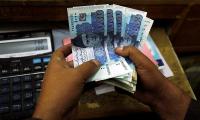IMF Asks Pakistan for Transparency in Investment Council
The IMF has asked Pakistan to ensure transparency in the Special Investment Facilitation Council and share a draft investment policy as the country seeks a fresh bailout. The lender also inquired about privatization of state-owned enterprises and tax exemptions for special economic zones.
Islamabad, May 21 (PTI) The IMF has asked Pakistan to share a draft of the under-preparation investment policy and ensure transparency in the working of the much-hyped Special Investment Facilitation Council (SIFC) as the cash-strapped country is seeking a fresh bailout package from the global lender, a media report said on Tuesday.
The SIFC was established in June last year under an economic revival plan devised by civilian and military leaders to capitalise on untapped potential in key sectors and attract foreign direct investment (FDI). The hybrid government body promises to create an enabling business environment in the country and offer a one-window solution to investors.
A visiting team of the Washington-based lender, which is on a sort of assessment mission, has not yet converted ongoing engagement into formal talks with the Pakistani authorities, The News International reported.
Both sides expressed divergent views on the macroeconomic framework for the next fiscal budget for 2024-25, the newspaper said.
The Pakistani authorities informed the International Monetary Fund's assessment team that the new investment policy was under preparation and would be announced after conducting due deliberations, the report said.
The IMF asked for transparency in the working of the SIFC. The assessment team also inquired about the potential investment in different projects and especially asked for privatisation of the national carrier Pakistan International Airlines (PIA) and other state-owned enterprises (SOEs).
Envisaging the CPI-based inflation on the higher average rate of 12.7 per cent for the next budget 2024-25, the Washington-based lender also inquired about the tax exemptions offered by the government for the upcoming Special Economic Zones (SEZs) under the China-Pakistan Economic Corridor (CPEC).
The IMF wants maximisation of non-tax revenues as the proposal under consideration is to increase the Petroleum Development Levy (PDL) for increasing collection up to Pakistani Rs 1.08 trillion in the next fiscal year or slap a carbon levy to compensate the zero rate of GST on petroleum products, The News International reported.
The international lender has recommended imposing 18 per cent GST on petrol and diesel along with PDL.
The IMF has refused to accept the macroeconomic framework of the Finance Ministry and so far pitched the macroeconomic framework for the next budget 2024-25 including a real GDP growth rate of 3.5 per cent while the CPI-based inflation was projected on the higher side at 12.7 per cent.
The Ministry of Finance has prepared a macroeconomic framework whereby the GDP growth was envisaged at 3.7 to 4 per cent while inflation was kept on average in the range of 11 to 12 per cent, the report said.
For the outgoing fiscal year 2023-24, the provision GDP growth figure may hover around 2 to 2.5 per cent of GDP against the official target of 3.5 per cent, it said.
Pakistan has made a formal request for a fresh bailout package of USD 6 to USD 8 billion under the Extended Fund Facility (EFF) with the possibility of being augmented through climate finance. If successful, it would be the 24th IMF bailout programme for the country.
Last month, Pakistan completed a short-term USD 3 billion programme with the IMF, which bailed the country out of any default.
It was unclear whether the IMF mission would end with a formal staff-level agreement for the next bailout package, according to The Express Tribune newspaper.
The duration, instrument, and size of the next IMF programme were open to discussion, the report said, quoting sources.
Pakistan narrowly averted default last summer, and the economy has stabilised after the completion of the last IMF programme, with inflation coming down to around 17 per cent in April from a record high of 38 per cent last May.
The country is still dealing with a high fiscal shortfall, and while the external account deficit has been controlled through import control mechanisms, it has come at the expense of stagnating growth, which is expected to be around two per cent this year compared to negative growth last year.
The SIFC was established in June last year under an economic revival plan devised by civilian and military leaders to capitalise on untapped potential in key sectors and attract foreign direct investment (FDI). The hybrid government body promises to create an enabling business environment in the country and offer a one-window solution to investors.
A visiting team of the Washington-based lender, which is on a sort of assessment mission, has not yet converted ongoing engagement into formal talks with the Pakistani authorities, The News International reported.
Both sides expressed divergent views on the macroeconomic framework for the next fiscal budget for 2024-25, the newspaper said.
The Pakistani authorities informed the International Monetary Fund's assessment team that the new investment policy was under preparation and would be announced after conducting due deliberations, the report said.
The IMF asked for transparency in the working of the SIFC. The assessment team also inquired about the potential investment in different projects and especially asked for privatisation of the national carrier Pakistan International Airlines (PIA) and other state-owned enterprises (SOEs).
Envisaging the CPI-based inflation on the higher average rate of 12.7 per cent for the next budget 2024-25, the Washington-based lender also inquired about the tax exemptions offered by the government for the upcoming Special Economic Zones (SEZs) under the China-Pakistan Economic Corridor (CPEC).
The IMF wants maximisation of non-tax revenues as the proposal under consideration is to increase the Petroleum Development Levy (PDL) for increasing collection up to Pakistani Rs 1.08 trillion in the next fiscal year or slap a carbon levy to compensate the zero rate of GST on petroleum products, The News International reported.
The international lender has recommended imposing 18 per cent GST on petrol and diesel along with PDL.
The IMF has refused to accept the macroeconomic framework of the Finance Ministry and so far pitched the macroeconomic framework for the next budget 2024-25 including a real GDP growth rate of 3.5 per cent while the CPI-based inflation was projected on the higher side at 12.7 per cent.
The Ministry of Finance has prepared a macroeconomic framework whereby the GDP growth was envisaged at 3.7 to 4 per cent while inflation was kept on average in the range of 11 to 12 per cent, the report said.
For the outgoing fiscal year 2023-24, the provision GDP growth figure may hover around 2 to 2.5 per cent of GDP against the official target of 3.5 per cent, it said.
Pakistan has made a formal request for a fresh bailout package of USD 6 to USD 8 billion under the Extended Fund Facility (EFF) with the possibility of being augmented through climate finance. If successful, it would be the 24th IMF bailout programme for the country.
Last month, Pakistan completed a short-term USD 3 billion programme with the IMF, which bailed the country out of any default.
It was unclear whether the IMF mission would end with a formal staff-level agreement for the next bailout package, according to The Express Tribune newspaper.
The duration, instrument, and size of the next IMF programme were open to discussion, the report said, quoting sources.
Pakistan narrowly averted default last summer, and the economy has stabilised after the completion of the last IMF programme, with inflation coming down to around 17 per cent in April from a record high of 38 per cent last May.
The country is still dealing with a high fiscal shortfall, and while the external account deficit has been controlled through import control mechanisms, it has come at the expense of stagnating growth, which is expected to be around two per cent this year compared to negative growth last year.
You May Like To Read
TODAY'S MOST TRADED COMPANIES
- Company Name
- Price
- Volume
- Vodafone-Idea-L
- 11.65 (+ 3.56)
- 106772451
- Alstone-Textiles
- 0.28 ( -3.45)
- 44187760
- Mangalam-Industrial
- 0.88 ( -2.22)
- 39177573
- Sunshine-Capital
- 0.27 (+ 3.85)
- 35956340
- GMR-Airports
- 104.40 (+ 6.37)
- 30453005





